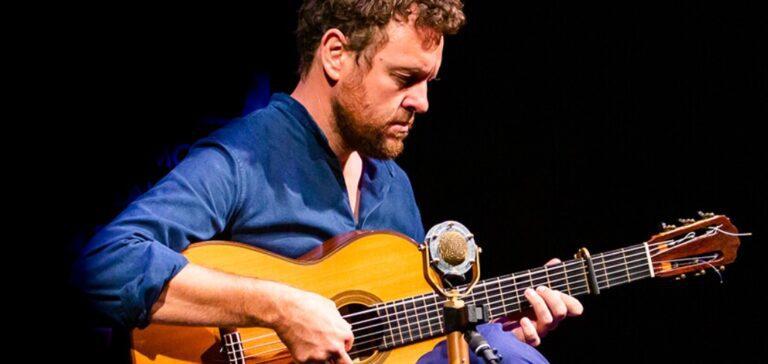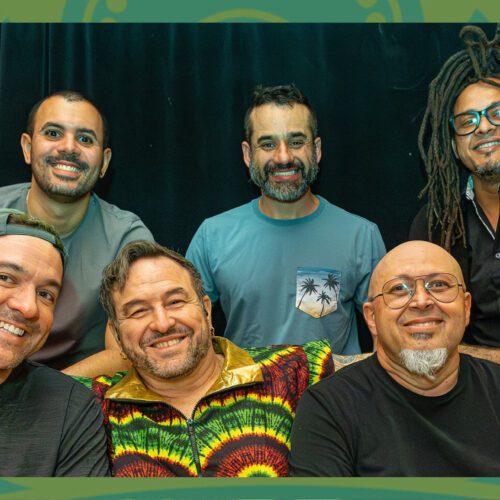Additional Information
From Cape Town, South Africa, Derek Gripper adapted some african music to his classical guitar training. He is known worldwide for his transcriptions of the great kora player Toumani Diabaté’s recordings – One Night on Earth (2011) and Librairies on Fire (2016). He also played in the Symmetric Orchestra led by the famous griot. Since when the guitarist has played original pieces of his own, he defines « extended cyclical structures ». More precisely, he draws from the oral and improvised traditions of African griots as he does from the South African cyclical traditions known as Koortjie. Then he adapts it to his classical guitar langage and creates a fabulous hybrid. So he can perform compositions from J.S. Bach or Arvo Pärt, as well he can adapt African music from Salif Keita, Fanta Sacko or Baaba Maal. In fact, Derek Gripper’s path is to bring together very different musical forms through a rediscovery of the nylon strings guitar.Because he’s performing on Thursday, March 23th, at Balattou Club, PAN M 360 wanted to learn more about his craft.
PAN M 360 : So you’re from South Africa. After listening to one hour or two or two hours of your music, we can have an idea of what you do but we must learn more. So how did you build that?
DEREK GRIPPER : So I’m, I came from classical music, classical guitar. And have been always looking for different things, different ways to use the guitar followed by you know, my interest and what is moving and what I love. And one of those things was the music of Toumani Diabaté and that I made, you know, very direct classical transcriptions of his music because I felt it was important for us to realize that this is an a great tradition of composition as well as you know, how we abnormally understand it as a griot traditional blah, blah, etc. Now, I’m actually playing with Ballaké Sissoko who recorded with Toumani, a very important album in the 90s called New ancient strings. So that’s wonderful, like coming back to that tradition in a very real way. But bringing my things, I was writing music of my own before, I really investigated Toumani’s music. And I’m still writing music. So what I do live, is I improvise a and I, I remember things spontaneously, and I travel between these different things from Bach to South African music, to the kora music to, you know, completely improvised things to things that the guitar suggests… everything.
PAN M 360 : So you you started as a classical while you had a classical training, and your training was in South Africa.
DEREK GRIPPER :Training was in South Africa, partly and also in other countries traveling, you know, to master classes and festivals, but yeah, my main training is in Cape Town, South Africa. It’s not a big thing in Cape Town. I mean you can study classical guitar at the conservatory if you want, but I can’t say that South Africa has produced many classical guitarists. If they are really serious about it, they leave. It’s not an easy place to make a career. So I’m very lucky. I’m probably the only nylon string player who’s making, you know, concerts all around the world and being able to really make a living from performance.
PAN M 360 : And also probably your transcription of Malian music. did help because it’s a very good idea.
DEREK GRIPPER : Yeah, I think that was a you know, it was harder for people to understand what I was doing before, you know, because it’s even hard enough for people to understand but the Malian transcriptions is something very clear. And I took that for 10 years in North America and Europe, Australia. And that was clear for people. « This person has translated choral music for guitar », you know, and that made it easier. Otherwise, it’s a strange mix between improvised music and classical music. Is this guitar music classical? The classical people don’t think it’s fully classical, it’s not jazz either. So it’s hard for people to understand.
PAN M 360 : So, more specifically, how did you develop this langage?
DEREK GRIPPER : Well, when I was playing this kora music at the beginning, I was working from transcriptions I did. So I would take a recording, and I would transcribe it and I would perform that as a composition, like a piece of Bach, because I wanted people to experience this specific piece from West Africa. And then as I learned the music, I learned how to improvise inside this music, I learned how to make my own improvising of it. Then I had my own compositions, which were different. But slowly, those two aspects have come together, and so it started to be a bigger and bigger language.
PAN M 360 : There are now many ways to develop the classical nylon string classical guitar. In an African way, there is no lineage for that king of playing that kind of guitar. The string instruments in Mali are kora or n’goni or other string instruments of that type.
DEREK GRIPPER : Actually Ballaké and I just recorded this album, we haven’t released it yet. We recorded it in London a few months ago. I’m busy finishing the production. What we’re doing and what I’m doing is a sort of improviser’s guide to African music. And what is improvisation in African music is very different to improvisation in jazz and other musics that includes improvisation. It’s collective and it’s about collective memory. But it’s also about spontaneity, and it inhabits a very different space in music. It’s a kind of mimetic improvisation.
PAN M 360 : Well, this is similar to ragas in South Asia and maqâms in Arabic, Turkish or Persian cultures : musicians have to learn and remember beats and phrases, and after improvise with those elements in real time.
DEREK GRIPPER : Yeah, exactly. It’s the recognition and the assumption of the collective. You know, solo improvisation with someone like Keith Jarrett is a great inspiration for me as an improviser. But the myth of the individual improvising his own ideas as a blank stalte, this very western concept that everything comes from the musician, is very different from the griot idea of improvisation. When you listen to someone like Ballaké improvising, he is always aware of what has gone before him. For him, music comes from the collective wisdom.
PAN M 360 : And so it’s a great playground to develop yourself and remaining in Africa even if it’s hard to be understood with what you’re trying to reach.
DEREK GRIPPER : Yeah, slowly, it becomes clearer to me and then to others.
PAN M 360 : It’s not your first time in Montreal, isn’t it?
DEREK GRIPPER : No, I love Montreal. I arrived in Montreal for the first time many years ago. I think it was in the winter series. I went to Balatou in the night time, I walked out of the snow and I walked into Africa, it was incredible. So, coming from Toronto, which for me feels very familiar in the sense of colonial Cape Town,a bubble in Africa, you know, so I’m like, yeah, Toronto, it’s an English colony but then you arrive in Montreal and it’s like, okay, this is a different story. I’ve always had such a good feel for Montreal and I was there last year for Nuits d’Afrique. I played then with the Montreal kora player Zal Sissokho. I have amazing respect for people like Zal, who take their music to this other place completely, especially a place with a hard winter where you can die (!) and you have to create a whole new world for yourself.
PAN M 360 : But this time there won’t be any people on stage but you.
DEREK GRIPPER : Just alone, which is nice because that gives me the best freedom in terms of what I can do. The solo concert is like a realm for me, it’s a free space. I can arrive really with an empty head and then just respond to the audience and the environment and the guitar and the day in and how I am. Just make something fresh happen.
























